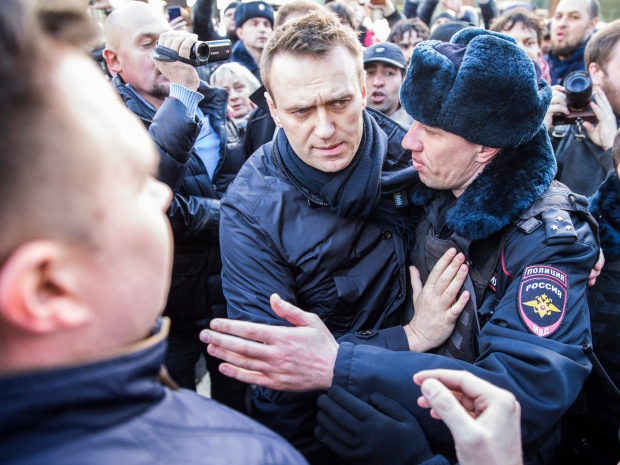Imagine if the Kremlin, instead of murdering its critics and interfering in foreign elections and adventuring abroad in complicity with the worst of autocrats, actually devoted its resources to developing a modern and economically diverse nation. That’s what the backwards-looking state desperately needs to do in order to avoid collapse, but evil does what it does. Rampant kleptocracy at the highest levels and deteriorating living standards have started to show some cracks in the supposed rock-solid popularity of Vladimir Putin, a capo with nuclear capabilities.
At the behest of opposition figure Alexei Navalny, protesters recently took Russia’s power elite by surprise. The activist, released after 15 days of detention, sat for a Spiegel Q&A with Christian Esch and Christian Neef. He argues that while citizens in the streets are starting to make noise, it’s those in Putin’s inner circle whom he fears most. An excerpt:
Question:
Why did these young people take to the streets?
Alexei Navalny:
Poverty! That, at least, is an important factor. The living standard here has been deteriorating for the past five years.
Question:
You don’t notice that in Moscow so much.
Alexei Navalny:
In Tomsk, I asked young people how many of them earn less than 20,000 rubles a month, that’s 330 euros. All of us, they answered. And that is in a university city that used to live from oil! People often say that I represent people who earn a lot of money. Of course, a person who is well-educated and affluent is more likely to support me than Vladimir Putin. But that doesn’t automatically mean that the others are against me.
Question:
What distinguishes the current protesters from those who demonstrated against the fraudulent 2011 parliamentary election?
Alexei Navalny:
The main difference is geographical: Now demonstrations are taking place in locations where they never did before, in Dagestan, in Tatarstan and in Bashkiria. Otherwise, there aren’t many differences. Social media, which has become our last remaining way of communicating with one another and of articulating our criticism, have a younger audience, that is all. …
Question:
Officially, the Kremlin acts as though it is fighting corruption, with five governors having been arrested — the fifth one just recently.
Alexei Navalny:
The governors are being arrested in order to steal some of my thunder. Besides , Putin needs to terrorize his own elite. He is more afraid of those in his own surroundings than any protests; there are people there who are at least as critical as I am because they see up close that the system doesn’t work. He wants to silence them.
Question:
Will President Putin run again in the 2018 election?
Alexei Navalny:
Of course! Putin wants to be the czar of this new Russian empire that he is rebuilding. I think he is really obsessed with the idea.•


![]](https://afflictor.com/wp-content/uploads/2016/04/valentina-tereshkova.jpg)